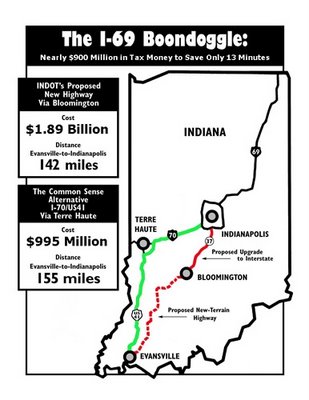I-69 "Commerce Connector": Indianans Sue to Unwittingly Halt Segment of NAFTA Superhighway
 Editor's note: Neither Indiana officials or opponents of an I-69 construction project seem aware of the plan's link to a secretive unilateral agreement reached last year by US, Mexican and Canadian leaders to integrate the three countries into a "North American Community."
Editor's note: Neither Indiana officials or opponents of an I-69 construction project seem aware of the plan's link to a secretive unilateral agreement reached last year by US, Mexican and Canadian leaders to integrate the three countries into a "North American Community."
One of reportedly 80 "stand alone" commerce corridors comprising the US portion of the North American SuperCorridor (NASCO, left)--a massive transcontinental combo road-train-truck transportation network physically linking the US, Canada and Mexico in an open-bordered North American Union--is slated for review and vote next year in the Indiana state legislature.
But neither state legislators or local environmental groups that recently filed a lawsuit to stop the proposed $1.8 billion construction project realize the plan is part of a much more ambitious privatized system (see page 4) of interlinking US toll roads either in place by early this year or under similar review in other states.
In March 2005, President Bush held meetings with then-Mexican President Vincente Fox and then-Canadian Prime Minister Paul Martin at his Crawford, Texas ranch culminating in their unilateral ratification of the Security and Prosperity Partnership of North America (SPP). Their plans, characterized as "NAFTA on steroids," calls for open borders and unrestricted trade facilitated by a super highway linking the three countries.
The three leaders' respective national judiciaries and legislatures were excluded from their review and approval process.
While major US media are conspicuously silent about their agreement or its disturbing implications, the Toronto Star reported the development a week after learning of a secret forum meeting in September among US-Canadian-Mexican officials in remote western Canada. Indiana business leaders and Republican Governor Mitch Daniels are promoting the proposed "Indiana Commerce Connector" toll road (see more detailed PDF file here) for the Northeast, East and South sides of Indianapolis as a strategy for boosting the state economy and traffic easement around the capitol city. But a cost analysis review conducted by the University of Indiana (see below) reveals that the Indiana Department of Transportation's projections of total costs and benefits to state residents were dramatically overstated.
Indiana business leaders and Republican Governor Mitch Daniels are promoting the proposed "Indiana Commerce Connector" toll road (see more detailed PDF file here) for the Northeast, East and South sides of Indianapolis as a strategy for boosting the state economy and traffic easement around the capitol city. But a cost analysis review conducted by the University of Indiana (see below) reveals that the Indiana Department of Transportation's projections of total costs and benefits to state residents were dramatically overstated. To date, only a handful of Indianians with homes or property along the right-of-way of the proposed construction project, slated to last ten years and eventually extend to the state's southwestern corner in Evansville, have voiced concern over the I-69 plan.
To date, only a handful of Indianians with homes or property along the right-of-way of the proposed construction project, slated to last ten years and eventually extend to the state's southwestern corner in Evansville, have voiced concern over the I-69 plan.
But the state's relative passivity markedly contrasts with opposition in Texas to the proposed system of commerce and trade toll corridors along that state's portion of I-69. Collectively called the TransTexas Corridor, the state-wide plan was quickly pushed through the Texas legislature last year, even though up to one million mostly rural Texans could be required to relocate when eminent domain laws are invoked to confiscate properties needed for the massive project.
What also angered many Texans about project was the awarding of a no-bid contract for construction and subsequent toll management of the roadways to CINTRAS, a Spanish consortium of construction and management companies that invested $7.2 billion in the plan.
With Lou Dobbs' increasingly high-profile opposition to the transcontinental integration proposal for its inordinate benefit to America's "investment class," President Bush expedited construction of the NAFTA superhighway this summer by appointing Mary Peters as Norman Minetta's replacement as US Transportation Secretary. According to author and Washington journalist Wayne Madsen, Peters has a checkered history as paid shill for the surface transportation industry that has carried over into her occasional stints as state and federal transportation officials (see September 8/9/10 entry).
In reviewing local news accounts excerpted below on the Indiana Commerce Connector, the plan, though no similarities are cited, resembles Texas's proposed TransCorridor project, which begins construction in early 2007. Because the Indiana legislature has yet to approve the project, no company is mentioned in connection to the I-69 loop plan or future service maintenance and toll collections contracts.
Local and State Reports on I-69 Loop
The three articles below offer contrasting perspectives on the $2 billion project, slated for initial construction in early 2008 to last for 10 years. The first, written some time after May 2006, actually includes the term "NAFTA Superhighway" (while the two news reports omit any such reference). Contact information also is provided for obtaining a free video from one group rallying local resistance to the plan, which is seen as a threat to rural sections of Indiana.
The news reports are from The Frankfurt (Indiana) Times and Indianapolis Star. Posted 3 October, The Times story, posted from one a town in a country in the project's proposed right-of-way, addresses area residents' legal opposition to a plan that "would destroy about 5,300 acres of farmland, 1,500 acres of woodland and 95 acres of wetland, and would damage or disturb some 400 acres of sensitive ecosystem in caves, sinkholes and underground streams, according to the plaintiffs."
The Star piece appearing on 10 November does a good job in interviewing several players on both sides of the story. But omitting any reference the NAFTA superhighway fails to situate the project in a vaster design clearly with national implications. The piece cite "mixed views" among state legislators, including concern over invocation of eminent domain.
1. NAFTA Superhighway Update
by Jan Lundberg
The University of Indiana has done a cost-benefit study on the Indiana portion of I-69, the first NAFTA Superhighway. It found that there would be a net loss of 19 cents per dollar spent. This updates the discredited Indiana Department of Transportation's study which claimed there would be $1.54 gained per dollar spent. (Read the rest of the report here.)
2. I-69 Opponents Sue in IndianaBy RICK CALLAHAN, Associated Press Writer
MARTINSVILLE, Ind. - Environmentalists and citizen groups sued the federal government and Indiana highway commissioner Monday, alleging that the state rigged the process for choosing a route to extend Interstate 69 from Indianapolis to Evansville.
The lawsuit asks a federal court to halt planning and design work on the state's favored route for the $2 billion project, which would extend the highway 142 miles through mostly rural counties primarily served by winding, two-lane roads. Construction is tentatively scheduled to begin in the summer of 2008.
The plaintiffs argue that officials violated federal law, including the National Environmental Policy Act and the Endangered Species Act.
The lawsuit also alleges that the route selection criteria was tailored to ensure that the state's preferred route was chosen, and that officials did not seriously consider upgrading existing Interstate 70 and U.S. 41 for the path. It contends that route would be significantly less expensive and cause less environmental damage.
"This case comes down to the state ignoring good sense, the law and public sentiment to choose the wrong route for Interstate 69 when there's clearly an environmentally and economically preferable route out there," said Tim Maloney, executive director Hoosier Environmental Council, one of the plaintiffs. (Read the rest of the story here.)
3. Gov. wants toll road loop around Indy
Daniel's pitch: 75-mile metro tollway would boost business, ease traffic.
Gov. Mitch Daniels promoted it as a launching pad for economic growth, a way to extend I-69 without tolls and a solution to traffic congestion around Indianapolis.
But his plan to build a privately run, 75-mile toll bypass through five counties is also raising concerns that the new highway would invite sprawl, harm the environment and lead to the possible forced seizure of land by the state.
.... Sen. Robert N. Jackman, R-Milroy, who represents some of the people whose land would be affected, said he is a strong supporter of preserving farmland. But, he said, change is coming to his rural area, and he and the local officials he's spoken to are excited by the plan.
David C. Long, the Fort Wayne Republican who is taking over as Senate president pro tempore, said he's sure he and other lawmakers will have questions. But right now he could see only positives -- a toll-free I-69, reduced congestion northeast of Indianapolis and an economic development generator for the counties the toll road would run through.
"The public is entitled to a full explanation of how this will result in growth and what type of growth are they talking about," said Sen. Timothy S. Lanane, D-Anderson. (Read more here.)
==
That "growth" as it's being pitched to you, Senator Lanane, entails the forcible restructuring of Indiana and most US states as we now know them--without adequate public notice or discussion.
Postscript: Watch CNN's Lou Dobbs here update progress on the North American Union.
Update: Governor Mitch Daniels, avid proponent of privatization as a panacea of all social ills, now is aggressively pursuing privatizing Indiana's lottery. Among the bidders are Greek, Italian and New York companies. When will investigators check Daniels' offshore banking accounts for kickbacks? Illinois is considering a similar privatization plan.

 NAFTA
NAFTA